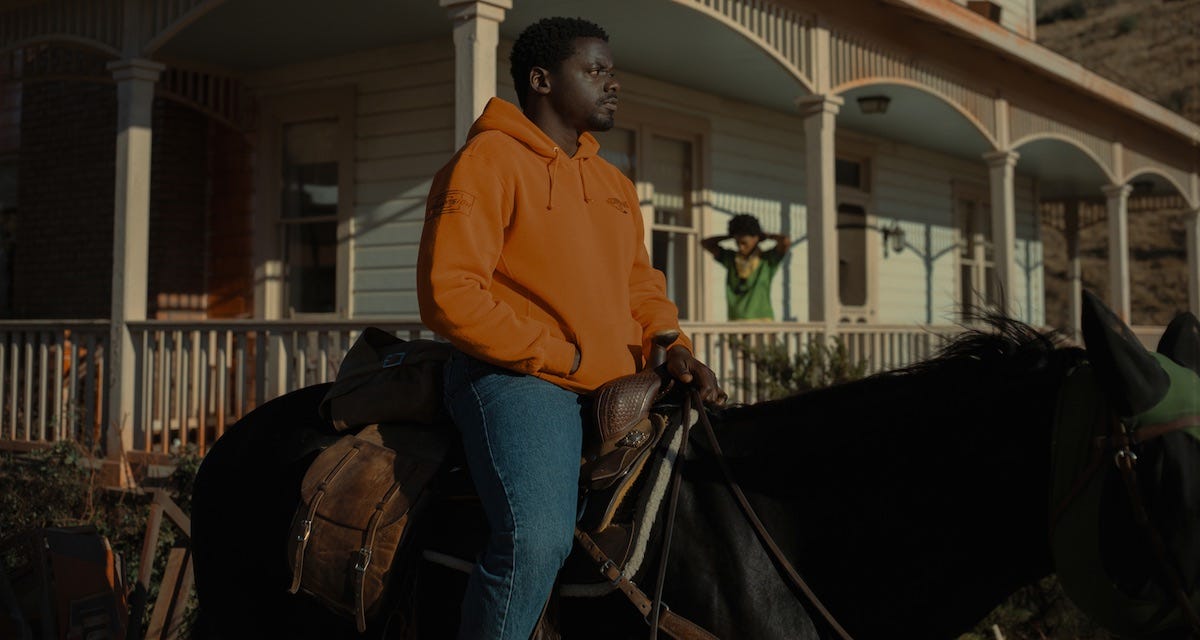'Nope' Review
‘Close Encounters’ by way of ‘Jaws’ as designed by Christo.
Nope is a sci-fi western horror movie, a movie about movies, and a critique of the commodification of trauma. As it’s playing, Nope feels like two or three different movies in one, a slurry of ideas and note cards that never quite gel even as the whole product remains compelling to watch and a joy to look at. Jordan Peele’s latest is a bit of a mess, but it’s a pretty, well-acted, ambitious mess, and that counts for a lot these days.
I’ll discuss the plot as little as possible to allow readers the chance to experience the film for themselves. In brief: Otis Haywood Jr. (Daniel Kaluuya)—OJ for short, a name that pays off in about the most predictable way possible early on when a white woman hears his name for the first time—wants to save his family’s ranch. Haywood’s Hollywood Horses has fallen on hard times following the surprising and horrifying death of patriarch Otis Sr. (Keith David), killed when a nickel fell from the sky and into his brain.
Jupe Park (Steven Yeun) wants to buy the ranch to add it to his theme park, but OJ and sister Emerald (Keke Palmer) resist, in part because, well, OJ thinks he saw a flying saucer. In order to capture footage of the flying saucer, OJ and Emerald enlist Fry’s Electronics employee Angel Torres (Brandon Perea) to install security cams and elite cinematographer Antlers Holst (Michael Wincott) to, in one of the film’s better jokes, wield a hand-cranked IMAX camera.
Oh, and a monkey with blood dripping from its mouth and paws makes the occasional appearance.
Again: there’s kind of a lot going on here! And I’m not entirely sure Peele manages to balance all the competing ideas and storylines. But even in its jumble, the whole thing feels disconcertingly real in each of its precise moments: Angel reminding OJ and Emerald about the survey regarding his performance they’re likely to get; Antlers realizing during a shoot that the light’s about to go golden; the pure delight of a good fried-fish sandwich.
That reality stems at least in part from Kaluuya and Palmer’s performances. Kaluuya, one of our best actors and coming off a deserved Oscar win for Judas and the Black Messiah, is stoic and stone-faced; he is a classic man of the West, the sort who watches more than he speaks, indeed, feels a little uncomfortable speaking with those he doesn’t know. He’s more than willing to let you make a fool of yourself and let it go with an “okay” and a nod or an “alright” and a grunt. Palmer’s performance is more antic but no less electric, the little sister with big dreams—perhaps too big.
I’d watch a whole movie about Steven Yeun and his character, a child star all grown whose move to theme park life is covering up a desperate trauma. There’s a terror just behind Yeun’s eyes at all times, and Peele rolls his story out for us nicely—to the extent that I kind of wish his Jupe was the proper protagonist, or at least given more screen time.
Nope doesn’t have the clockwork precision of Get Out’s screenplay nor the unity of that film’s message; it’s much rougher, more scattered. And Nope doesn’t have the almost claustrophobically terrifying vibes of Us, a movie that’s similarly messy in its messaging but has a nightmare logic to it that’s deeply unsettling, that gets under your skin, that sticks with you after you leave the theater or revisit it on Blu-ray.
Nope is, in other words, probably the least of Peele’s three directorial features. But considering the strength of the other two movies, that’s a very light knock indeed. And you’re well served watching this on IMAX if you can find it—cinematographer Hoyte van Hoytema (Dunkirk, Interstellar) didn’t hand-crank that 70mm film so you could watch it at home on your tiny little TV.



